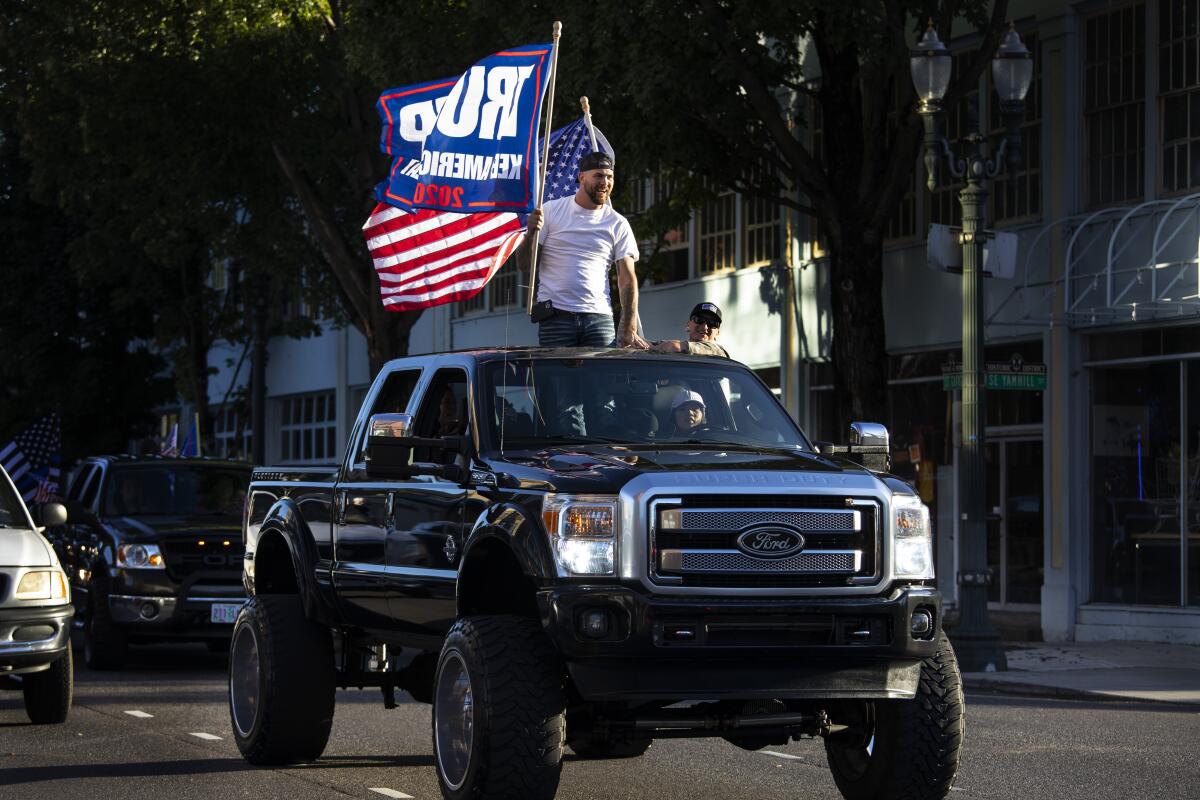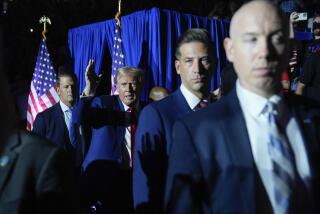Trump and allies seek to turn violence at protests to his advantage

WASHINGTON — President Trump and his allies sought to depict protests over racial injustice as a law-and-order campaign issue Sunday, attacking Democratic leaders, refusing to condemn deadly vigilante violence and touting a purportedly tranquil “Donald Trump’s America” as former Vice President Joe Biden accused him of inciting violence for political gain.
Against the backdrop of a still-raging coronavirus outbreak, the White House offered the clearest signal yet of a calculated GOP strategy of exploiting voter fears of violence as the campaign against Biden enters the final stretch.
The strategy closely resembles the one Trump employed, unsuccessfully, in the 2018 midterm election, when he spent weeks warning of “caravans” of migrants trying to reach the U.S. border with Mexico. That approach failed to stave off large Democratic gains in congressional races, but Trump has returned to it this year as he continues to lag behind Biden in polls of the presidential race.
Trump plans a visit Tuesday to Kenosha, Wis., where protests have flared for the last week over the police shooting of Jacob Blake, a 29-year-old Black man who was left paralyzed, and where a teenage gunman who reportedly idolized law enforcement has been charged in two deaths. Administration officials provided no indication that Trump wants to meet with Blake’s family, with whom Biden and his running mate, Sen. Kamala Harris (D-Calif.), have talked at length.
Amid a stream of inflammatory tweets and retweets Sunday, the president castigated the mayor of Portland, Ore., where a caravan of Trump supporters late Saturday confronted protesters. One man, identified as a member of a right-wing group, was shot dead.
“Bring in the National Guard!” Trump demanded.
Biden countered with a statement condemning violence and accusing Trump of “recklessly encouraging” it.
“The deadly violence we saw overnight in Portland is unacceptable. Shooting in the streets of a great American city is unacceptable. I condemn this violence unequivocally,” Biden said, adding that “I challenge Donald Trump to do the same.”
“We must not become a country at war with ourselves,” he said.
Trump’s presidency has been characterized by a staunch refusal to reach out to Americans outside his base of support. The latest rhetoric from the president and his surrogates took that one step further, setting out an explicit effort to cast urban Democratic strongholds as threatening and lawless, in contrast with less densely populated parts of the country where the president’s loyalists dominate.
“Most of Donald Trump’s America is peaceful,” White House Chief of Staff Mark Meadows said Sunday on NBC’s “Meet the Press.”
Critics of the president say such a characterization is not only corrosively divisive, but also illogical because, as Sen. Amy Klobuchar (D-Minn.) put it, recent events including the COVID-19 pandemic and months of unrest over police brutality are “happening under Donald Trump’s watch.”
Klobuchar, a former Democratic presidential contender who appeared on ABC’s “This Week,” sought to turn Meadows’ contention on its head.
“We are not safe in Donald Trump’s America,” she said, echoing a new Biden campaign advertisement.
Rep. Adam B. Schiff (D-Burbank), a prominent Trump critic who heads the House Intelligence Committee, said on CNN’s “State of the Union” that the president is “willfully fanning the flames of this fire.”
“The president is only motivated by one thing: what is in it for him,” Schiff said. “He sees this violence, and his ability to agitate more of it, as useful to this campaign. What it does to the country, the loss of life — he doesn’t care.”
Trump began the day by sharing a video of the caravan of his supporters in Portland who sprayed chemical irritants and fired paintballs from the back of trucks at protesters. In his message on Twitter, he called them “GREAT PATRIOTS.”
He also liked a tweet in which a Twitter user referred to Kyle Rittenhouse, the teenage suspect in Kenosha, as “a good example of why I decided to vote for Trump.”
Ted Wheeler, Portland’s mayor, rejected Trump’s rhetoric.
“You’ve tried to divide us … and now, you want me to stop the violence that you helped create,” he told a briefing in the city, addressing Trump directly. “President Trump, you bring no peace. You bring no respect to our democracy.”
Senior Trump aides appearing on the Sunday news talk shows either changed the subject or defended the president when those latest tweets were read out for them.
The acting secretary of Homeland Security, Chad Wolf, was asked on CBS’ “Face the Nation” whether the president’s retweet of the video from Portland heightened tensions.
“Absolutely not,” he replied.
Appearing on “State of the Union,” Sen. Ron Johnson (R-Wis.), the chairman of the Senate Homeland Security Committee, refused to condemn Rittenhouse. He said he did not support vigilantism, but “I’m not sure that’s what was happening” in the case of the 17-year-old, who has been charged with first-degree homicide, among other charges.
Meadows, asked in his “Meet the Press” interview why Trump had not condemned armed supporters who take the law into their own hands, replied that he “has asked for the proper investigations.”
“The president is on the side of law enforcement and the rule of law,” he said.
Democrats say Trump’s consistent eagerness to quash protests using federal agents — exemplified by the forceful clearing this summer of a square in front of the White House to facilitate a presidential photo op in front of a historic church — has needlessly escalated confrontations in Portland and elsewhere.
“This is exactly what happens when Homeland Security, the intelligence community, the military who are charged with protecting our homeland, are politicized,” said Rep. Val Demings (D-Fla.) — a former chief of police of Orlando, Fla., who was one of the contenders for the Democratic vice presidential spot. She spoke on CBS’ “Face the Nation.”
Trump campaign surrogates including the president’s daughter-in-law, Lara Trump, acknowledged they were following a road map sketched out by senior White House counselor Kellyanne Conway, who told Fox News last week that “the more chaos and anarchy and vandalism and violence reigns, the better it is” for Trump. Conway is leaving her White House job this week.
Interviewed on “Fox News Sunday,” Lara Trump agreed, saying that if potential Biden supporters saw scenes of street clashes, “I bet their mind was changed.”
Biden’s deputy campaign manager, Kate Bedingfield, interviewed on the same show, said the Trump campaign had falsely accused Biden of failing to condemn violence associated with racial justice protests.
“That’s absolutely not true,” she said.
Trump, Bedingfield said, was seeking to deflect attention from COVID-19, the disease caused by the coronavirus, which has killed more than 180,000 Americans, the world’s highest reported death toll.
“Part of why we are in the state of chaos that we’re in in this country is because Donald Trump has failed to lead on the coronavirus — he failed to take it seriously from the outset,” she said.
A powerful rebuke to Trump came from a senior Black Democrat in the House, Rep. Cedric L. Richmond of Louisiana, in an appearance on “Meet the Press.” In 2016, he said, then-candidate Trump asked Black voters, “What do you have to lose?”
“I think now Black men see clearly what they have to lose,” Richmond said. “They can get killed, and the president won’t say a word.”
More to Read
Get the L.A. Times Politics newsletter
Deeply reported insights into legislation, politics and policy from Sacramento, Washington and beyond. In your inbox three times per week.
You may occasionally receive promotional content from the Los Angeles Times.










